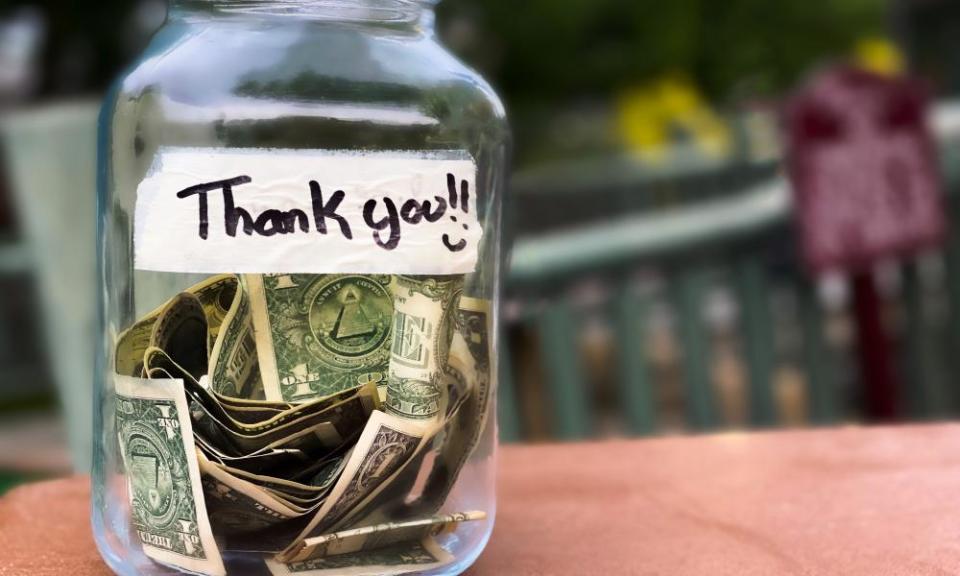‘Guilt tipping’: is there any escape from the gratuitous rise in gratuities?

I’m writing this column from Las Vegas where I’m attending a conference. This morning, I went to a coffee shop in the hotel. The cost of my small coffee was $6.49 and no, I am not kidding. Welcome to Vegas.
To add insult to injury, the cashier who served me the coffee – which took her about five seconds – spun the point-of-sale device around and stared me in the eye as I looked down at that screen that is all-familiar to most of us: the request for a tip. The minimum tip displayed was 20%. Or I could choose “no tip.” What do I do? C’mon, what do you think I did? I walked away sipping my $7.79 small coffee.
Related: A four-day week can work for US small business owners. Hear me out | Gene Marks
Yeah, you’ve been here too. Thanks to all these new point-of-sale devices that every small business seems to be buying nowadays you’re getting asked to tip for things you’ve never tipped for before. I’m now tipping when I pick up a takeout order. I’m tipping when someone scoops out an ice-cream cone. I’m tipping when I buy a muffin at my local bakery. I’m even tipping when I pick up my dry cleaning. Sure, I have a choice. But what am I, a jerk? Wait … don’t answer that.
It’s called “guilt tipping”. It’s been going on for a while. It escalated during the pandemic when we wanted to congratulate ourselves for supporting those service workers for doing their jobs in such terrible times while we watched Netflix. But the practice is now permanently in place and growing in use. And with inflation picking up those added pennies are starting to draw more attention.
The problem has even caught the attention of the federal government, with the IRS recently reminding both service providers and employees that they have to report all those extra tips. Other experts are warning that imposing tips in this manner could fall under the Consumer Financial Protection Board’s escalating war on junk fees.
The whole thing is annoying because tipping is an annoying part of the American economy. It should be illegal here. Like so many other countries, “tips” should be built into an employee’s compensation so consumers don’t have to grapple with the issue every time they make a purchase. Doing so would reduce many regulatory and tax burdens that create headaches for small businesses and their employees who are required to report this income. It would also eliminate conflicts and lawsuits that occur when some businesses don’t properly share tips with their staff and it would certainly make the payment process easier and less stressful for customers.
But I’m dreaming here. Tipping isn’t going anywhere in the US. And even if tipping was abolished businesses would quickly pass down their increased compensation costs to the customer anyway, so what’s the difference anyway?
According to payment processing company Square, tips at full-service restaurants grew by 25% in the third quarter of 2022. For restaurants with counter service, Square says tips were up nearly 17%, most likely because of the widespread use of those point of sale, spin-around card readers which, not coincidentally, Square sells. Yeah, they know the deal. They know that by selling more of these devices to small business owners, those same owners can avoid paying more to their employees.
So what’s the answer to this dilemma. I’m afraid to say that maybe we just have to embrace it. Yes, the customer winds up paying more but we feel like it’s going directly to the employee. These people work hard. And so do their employers. And at least I’m still being given the option of not tipping, so I can delude myself into thinking that I have some control over the process and that I care.
If you’re a running a small business where you can discreetly pass down your compensation costs to your customers this way I say go for it. Countless small business owners are already dealing with tight margins and a labor shortage. This is good for your small business. And it’s the American way.

 Yahoo Finance
Yahoo Finance 